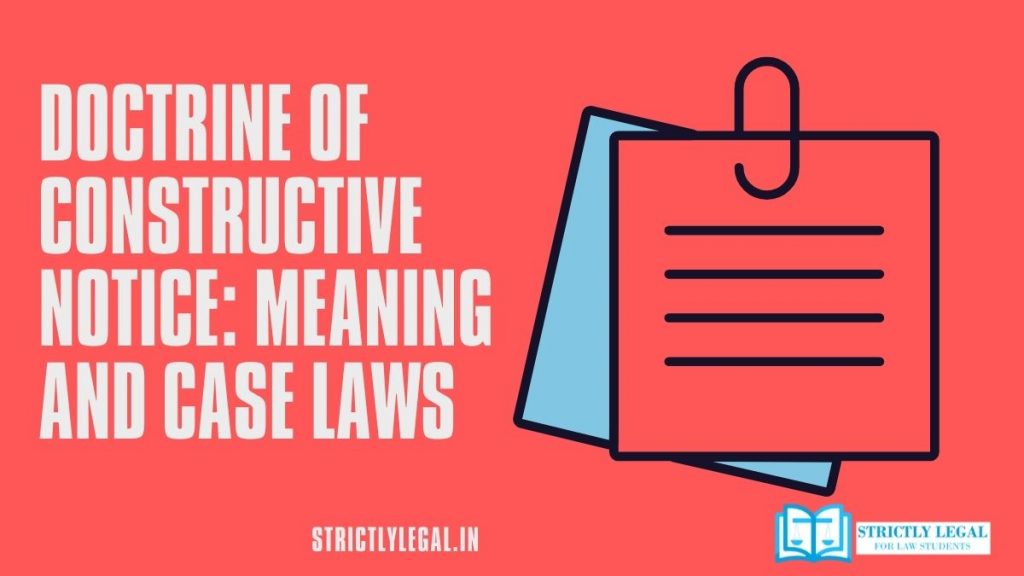In this article we will learn about the doctrine of constructive notice and relevant case laws. But first, we will understand different meanings such as Constructive notice and MOA and AOA of a company.
Table of Contents
Memorandum and Articles of Association
A company is a separate legal entity and certain rules have to be laid down for its functioning. The memorandum of Association (MOA) and Articles of association (AOA) are two important documents that lay the scope, authority, and powers within which a company must operate. Any act by the persons running the company even the Board of directors which is beyond the scope of these two documents is ultra vires or null and void.
Meaning of Constructive notice
A notice may refer to a notification given to any person in order to acquaint him with certain facts so that he may take appropriate actions on that behalf.
Notices could be of two types:
- Real or Physical: That is existing in paper and ink, sent to the person acquainting him with the facts containing therewith.
- Constructive or deemed: That is not existing in real form but deemed to understood to convey a certain fact.
This doctrine of Constructive notice is based on the later type. It is a deemed notice of certain facts about the MOA and AOA.
Meaning of rule of constructive notice
(what is meant by doctrine of constructive notice?)
This doctrine is based on the principle of presumption of knowledge and is mostly relevant in company law. As we know, it is mandatory for every company to get registered its MOA and AOA i.e Memorandum of association and Articles of Association with the registrar of companies. The registrar of company being a public office on registration of these two documents, makes these two documents public.
Any person dealing with the company is presumed to have read these two documents and understood them in their true meaning. This deemed knowledge of two documents and their contents is said to be the doctrine of constructive notice.
Now, when a person deals with a company which is not in accordance with the provisions of the memorandum and articles of association, or enters into a transaction that is beyond the scope and powers of the company, such person will not be protected by law but will have to bear with the consequences on his own.
The doctrine of constructive notice is not a positive doctrine but a negative one. It prevents from alleging that a person did not know a particular act is ultra vires the company. It is therefore, responsibility of the party entering into the contract with the comapany to inspect the documents and understand them in their true meaning.
Case law
It was held in the case of Ashbury railway carriage and iron company limited vs. Riche (1875) that the company’s contract to finance riche for laying down tracks in belgium is ultra vires i.e null and void because the Memorandum of Association (MOA) of the company contained the object of making, selling , hiring railway carriage and wagons, mechanical engineering and general contracts It never mentioned about financing contracts.
The court applying a rule of interpretation of statutes i.e Ejusdem Generis held that the term ‘and general contracts’ would derieve its meaning from the preceding specific word i.e ‘Engineering contracts’ and it does not cover financing contracts.
In this case, Riche did not get compensation because of the doctrine of constructive notice.
In another instance in Kotla Venkataswamy v. Chinta Ramamurthy AIR 1934 Madras 579. it was mentioned in the Articles of Association of the company that if anytime the properties of the company were to be held as mortgage, three signatories namely, the managing director, working director and the company’s secretary would be mandatory.
But while a mortgage deed was being executed in favour of the plaintiff, it was noticed that there are only two signatures. The managing director’s signature was missing. The court held that the mortgage deed was invalid as the plaintiff being an outsider must have read the public documents of the company i.e the Articles of association before dealing with the company.
FAQ
Doctrine of Indoor management is an exception to the rule of constructive notice. It says that as far as the internal proceedings of the company is concerned, it is presumed to have correctly done.
Under the rule of constructive notice, the member, creditor, or any person dealing with the company is deemed to have knowledge of the Memorandum and Articles of Association. This is known as the doctrine of constructive notice,
The doctrine of Constructive notice does not protect the company as far as internal proceedings of the company are concerned. This is also an exception to this rule.
It prevents an outsider dealing with the company to deny that he did not know that a particular act would render ultra vires or beyond the scope and authority of the company.

Passionate about using the law to make a difference in people’s lives. An Advocate by profession.





